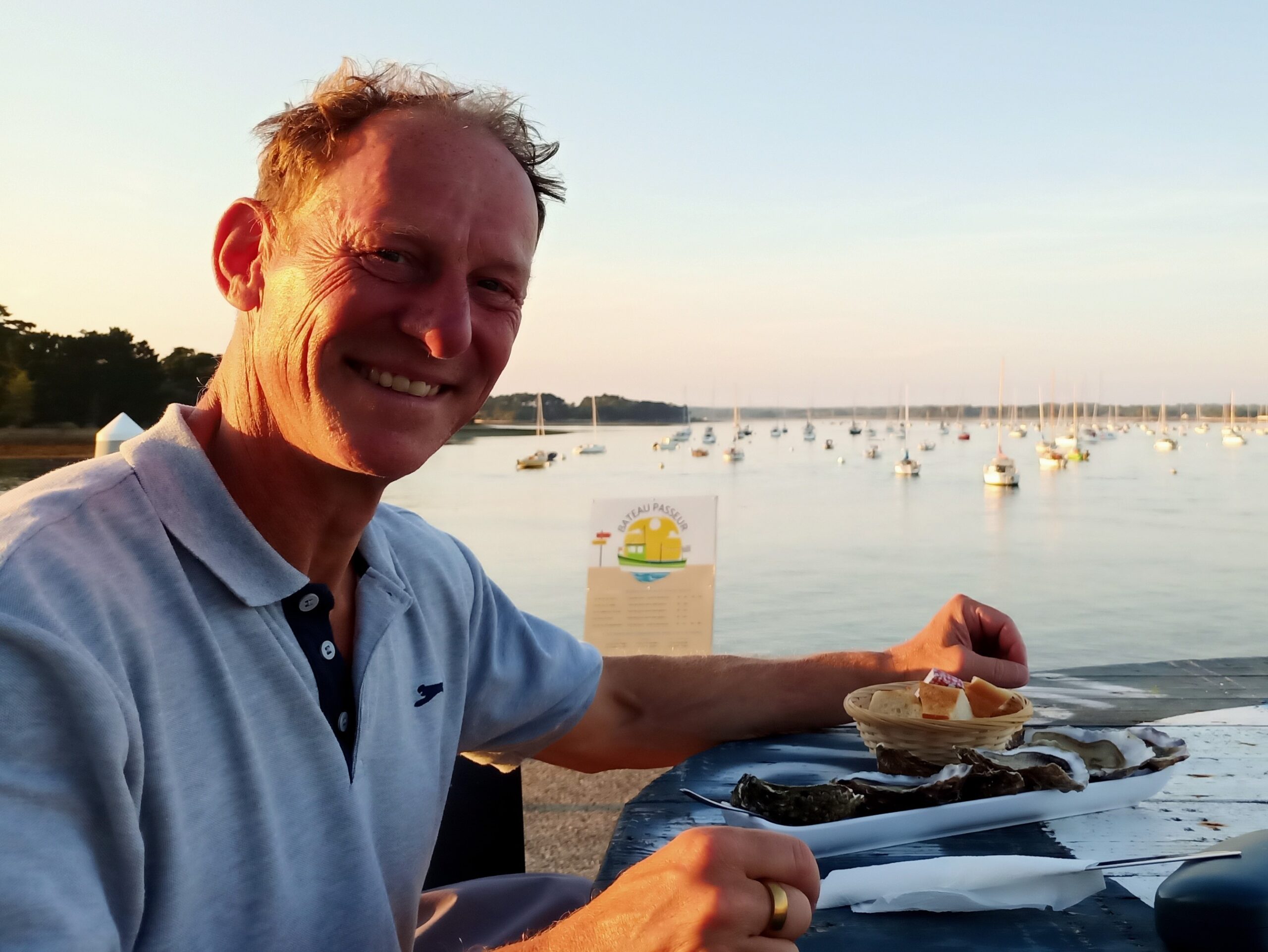
The day starts grey. Newlyn is covered in clouds – ideal to get through my fitness programme before I set off. But I don’t really have a programme any more; I always see what I can do situationally… Today I jog along the coast to see what it might look like out at sea (it looks like shit, if I may say so; the harbour master guessed it right). Then I do jumps on one and both legs, push-ups in different variations, stretching exercises, before jogging back. In the end I’m out for almost two hours. Then I take a shower, eat something and prepare my provisions, and want to take the plunge. I check everything again and say goodbye to my neighbours (the sailors stay in the harbour, their apps show decreasing wind, standstill). They wish me luck.
The beginning is restless, inside me as well as on the water. I have a lot planned: 200 km of open sea (the English Channel is more like a big funnel here, which only narrows much further east), then about 100 km along the Breton coast, and moor where I think it’s suitable (I’ll decide later; I have no idea what else will happen on the way and whether I’ll easily get past the currents or the coastguards or whatever is ‘waiting’ for me). The fog increasingly pushes down to the water’s surface; I rush into a diffuse grey and see maybe 100 to 300 metres away. At the same time – as I have often observed – the water surface calms down (although there is probably no causal connection, it has simply been like that so far, except at the Pentland Firth…) and exactly what the harbour master was convinced of happens, that the water reacts to the wind with a delay. Anyway, I glide at high speed over an increasingly glassy sea.
There is voracious activity here, too; circling flocks of birds above me show that there must be schools of fish below me (how do birds actually orient themselves in the fog; how do they find each other in the middle of the English Channel?), and where there are schools of fish on the water’s surface, there are also dolphins. But today I’m not in the mood to observe, so I slow down and enjoy the spectacle, but soon move on.
At some point, I am already close to the French coast, I receive clear radio signals that speak directly to me: In a commanding tone, a channel authority contacts me about my ship’s name and MMSI in funny-looking English with a French accent and asks me gruffly what I’m doing there and how many people are on board and where I want to go. I tell him that I’m heading for La Rochelle and that he can see me via AIS – and ask if there are any other ships in the fog that might have switched off their AIS. But instead of getting an answer, he snaps at me why I haven’t answered his radio messages earlier; he’s been trying to reach me for hours. – Radio messages? Did I hear? Aha… Trustingly, I assure him I heard nothing, sorry.
It’s worth pretending to be ‘blond’ and pointing out that he can see my type of boat via AIS – until he gives in and realises that I can’t receive any radio messages a few dozen kilometres away from the nearest (land-based) transmitter with my antenna, which only protrudes three metres above the water at the tip.
Even this storm in a teacup soon dies down; I speed along and concentrate on passing the first dangerous spot off Brest mentioned by my sailing neighbours. But obviously I’m faster than he assumed here, so the tidal currents haven’t even started yet (or the wind is far too weak). I slip between the islets at the north-western tip of Bretagnes (near the village of Le Conquet) without noticing anything at all. Only at the second danger spot, between Île de Seine and the mainland some 40 minutes later, do I feel underwater eddies. And I realise that perception is always relative. Maybe I’m lucky again, or already somewhat experienced, or both, and get through this passage without any problems.
Now it’s time to look around to see which harbour I want to enter. I can now compare the information on the plotter with the internet, so close to the coast where I have reception again with my mobile phone. I prefer ports with their own petrol station! Rather emotionally, I decide on the town of Loctudy, which is now just under 70 km or about 80 minutes away.
The entrance to Loctudy is in bright evening sunshine! – Once again, everything somehow fits together: I am here too late to introduce myself to the harbour master (the Capitanerie) and register (French work ethic; in a purely recreational harbour, clear working hours prevail and even the breaks are written in large letters at the entrance – no one should dare to knock at an unseasonable time), which saves me possible unpleasant questions. But I’m here early enough to meet all the other boat owners who are just getting ready to go out for dinner in this beautiful weather. So I get the codes for the gates, the toilets and showers, the bikes, and a tip or two about what I could do here …
Everything is wonderful; all the burden is gone and after the shower I feel as if reborn. I first stroll to a pub near the pier, where many people are sunbathing with a glass of white wine – and only now realise that here, as in England, no one wears a mask. Have I really arrived in France?
Anyway, I sit down, let myself be infected by the new, light and airy lifestyle, and order a portion of oysters.